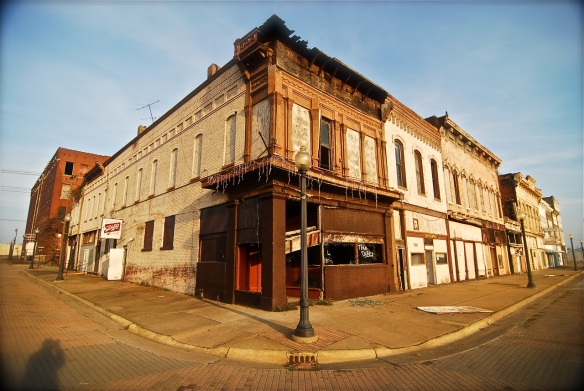What’s in a name?
Spread across the United States, but especially in the Midwest, are several towns and cities bearing Middle Eastern, if not explicitly Islamic names: Mecca, Mahomet, Morocco, Cairo.
George Stewart’s classic Names on the Land offers some explanation, but only for Cairo, Illinois. He writes:
Various imaginative people had not failed to compare the Mississippi with the Nile. Analogies were obvious enough. Both were great and muddy rivers, given to inundations, highways for travel. The hope was also expressed that a new and greater civilization, surpassing even that of ancient Egypt, might soon develop along this “Nile of America.” Such analogies and hopes soon suggested the transplanting of Egyptian names. In 1818 a St. Louis merchant laid out a town at the junction of the Ohio and the Mississippi, and incorporated it as Cairo. The site was unhealthy and bad luck dogged the town. Charles Dickens in Martin Chuzzlewit pilloried it as the City of Eden. It never rivaled its prototype, but the influence of its name was great. Because of Cairo (pronounced Kay-ro) all Southern Illinois came to be known as the Land of Egypt, or merely Egypt, and its inhabitants are Egyptians even to this day.
Farther down the river also, another town was laid out, shortly after Cairo. Its founders too cherished hopes for its greatness, and were conscious of the Nile of America. They remembered the great city of ancient Egypt, and called their new venture Memphis. (Stewart, Names on the Land, 238-9)
Nathaniel Deutsch more recently has addressed others of these names in his study of the “Tribe of Ishmael” in America. In one section, where he critically analyzes the “Islamic hypothesis” of Hugo Leaming (see the book for further details), Deutsch discusses Mahomet, Illinois and the towns of Morocco and Mecca in Indiana.
Local legends concerning the origins of Mahomet, Illinois and Morocco and Mecca, Indiana, reveal no links to the Tribe of Ishmael. In the case of Mecca, however, they do suggest a possible connection to Islam. According to one local story, in the 1890s a tile plant was built in the vicinity of the town, “and they needed cheap workers, so they sent over to the Near East and got these Moslems… When they got paid, they’d come to town and say it was almost like coming to Mecca, and so they called the town Mecca.” Another local tradition traced the genesis of the towns name to the 1880s, when Arab workers from the Middle East were supposedly brought in to train Arabian horses.
Even though the names of Midwestern towns like Mahomet, Morocco, and Mecca do not teach us anything about the Ishmaelites, they do teach us something important about the presence of Islam in Middle America. Such names should be seen as part of the broader flowering of romantic Orientalism in America’s heartland during the second half of the nineteenth century. Residents of towns like Morocco and Mecca were attracted to these names for the same reason that they joined the Ancient Order of the Nobles of the Mystic Shrine, visited the simulated streets of Cairo at the Chicago’s world’s fair of 1893, and smoked cigarette brands called Camel, Mecca, and Medina. As formerly rugged places like Indiana and Illinois ceased to mark the American frontier, residents began to turn their gaze from the Middle West to the Middle East in search of a new frontier-one to be imagined and consumed rather than physically settled.
During the same period that Shriners with names like Johnson and Kelly were donning fezzes and meeting in places like the Mohammed Temple in Peoria, Illinois, Arab immigrants from the Middle East were beginning to arrive in significant numbers in the United States. In the 1880s and 1890s, Muslim, Christian, and Druze Arabs established substantial communities throughout the Midwest, both in large cities like Detroit and Chicago and in smaller towns like Fort Wayne, Indiana, and Spring Valley, Illinois. We will probably never know whether Mecca, Indiana, received its name form Muslim laborers who settled in the town during this period, but more importantly, the local legends that suggest such an origin for the name Mecca point to the broader phenomenon of Muslim settlement in rural towns across the Midwest. (Deutsch, Inventing America’s “Worst” Family, 166-7)
George R. Stewart. 2008. Names on the Land: A Historical Account of Place-Naming in the United States. New York: New York Review Books.
Nathaniel Deutsch. 2009. Inventing America’s “Worst” Family: Eugenics, Islam, and the Fall and Rise of the Tribe of Ishmael. Berkeley: University of California Press.

